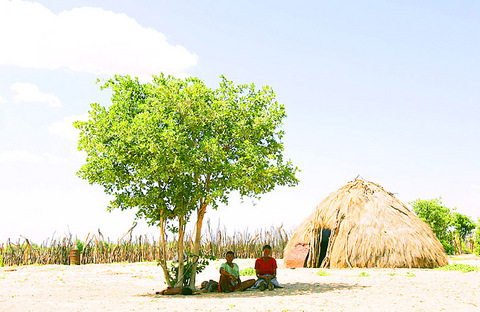The Bushmen of Botswana fear for their future, whether they return to ancestral lands in a national park or stay on the desolate reserves where they were forced to move.
Basarwa tribesmen, also known as Bushmen, won a court order last month allowing them to return to land in the Central Kalahari Game Reserve from which the government had expelled them. Government officials, though, say the tribesmen can't take along domestic animals or other items that have become necessities for these descendants of hunter-gatherers.
"They also said they would determine amounts of water we take in," said Keratwaemang Kekailwe, one of the 189 Basarwa who filed suit.

PHOTO: AP
In September 2005, he and 22 other Basarwa were prevented from re-entering the reserve by Botswana police firing rubber bullets. Now he lives in an isolated resettlement camp known as Kaudwane.
President Festus Mogae last week asked the Basarwa to stay where they are until he speaks to them tomorrow in New Xade, another of the camps, about the way forward after the judgment.
"He will also listen to what people have to say," presidential spokesman Jeff Ramsay said on Sunday.
Backed by the British based group Survival International, the Basarwa fought the longest running legal battle in Botswana's postcolonial history to return to the reserve.
The verdict by the Botswana High Court that the government's eviction of the Bushmen was "unlawful and unconstitutional" was hailed as a victory for indigenous peoples around the world.
The court also ruled that the Bushmen have the right to hunt and gather in the reserve, and should not have to apply for permits to enter.
The government has said that only the 189 people who filed the lawsuit would be given automatic right of return with their children -- short of the 2,000 the Basarwa say want to go home.
Along with the restrictions on domestic animals and water, they will also not be allowed to build permanent structures. Hunters will have to apply for special permits.
The government shut the main well in 2002 and water resources are scarce.
It's as if the US Supreme Court had ruled Hopi tribespeople could make their homes in the Grand Canyon, and the US government said any that took the opportunity would have to live there as their ancestors had a millennium ago.
The Botswana government argues it must protect the reserve as a national tourism resource. But Joram Useb, from the organization Working Group for Indigenous Minorities in Southern Africa, said the Bushmen should be allowed to take their domestic animals in and there were similar projects in Kenya and Tanzania involving indigenous people that could be studied and applied to Botswana.
"A buffer zone could be established so the domestic animals don't mix with the wild ones," he said, adding the Bushmen should be able to develop an economy for themselves through tourism and other initiatives.
Robert Thornton, a cultural anthropologist at South Africa's University of the Witwatersrand, said the court victory established "that indigenous cultural rights and land access should be protected."

Yemen’s separatist leader has vowed to keep working for an independent state in the country’s south, in his first social media post since he disappeared earlier this month after his group briefly seized swathes of territory. Aidarous al-Zubaidi’s United Arab Emirates (UAE)-backed Southern Transitional Council (STC) forces last month captured two Yemeni provinces in an offensive that was rolled back by Saudi strikes and Riyadh’s allied forces on the ground. Al-Zubaidi then disappeared after he failed to board a flight to Riyadh for talks earlier this month, with Saudi Arabia accusing him of fleeing to Abu Dhabi, while supporters insisted he was

The Chinese Embassy in Manila yesterday said it has filed a diplomatic protest against a Philippine Coast Guard spokesman over a social media post that included cartoonish images of Chinese President Xi Jinping (習近平). Philippine Coast Guard spokesman Jay Tarriela and an embassy official had been trading barbs since last week over issues concerning the disputed South China Sea. The crucial waterway, which Beijing claims historic rights to despite an international ruling that its assertion has no legal basis, has been the site of repeated clashes between Chinese and Philippine vessels. Tarriela’s Facebook post on Wednesday included a photo of him giving a

Syrian President Ahmed al-Sharaa on Sunday announced a deal with the chief of Kurdish-led forces that includes a ceasefire, after government troops advanced across Kurdish-held areas of the country’s north and east. Syrian Kurdish leader Mazloum Abdi said he had agreed to the deal to avoid a broader war. He made the decision after deadly clashes in the Syrian city of Raqa on Sunday between Kurdish-led forces and local fighters loyal to Damascus, and fighting this month between the Kurds and government forces. The agreement would also see the Kurdish administration and forces integrate into the state after months of stalled negotiations on

‘MOBILIZED’: While protesters countered ICE agents, Minnesota Governor Tim Walz activated the state’s National Guard to ‘support the rights of Minnesotans’ to assemble Hundreds of counterprotesters drowned out a far-right activist’s attempt to hold a small rally in support of US President Donald Trump’s latest immigration crackdown in Minneapolis, Minnesota, on Saturday, as the governor’s office announced that National Guard troops were mobilized and ready to assist law enforcement, although not yet deployed to city streets. There have been protests every day since the US Department of Homeland Security (DHS) ramped up immigration enforcement in the Twin Cities of Minneapolis and Saint Paul by bringing in more than 2,000 federal officers. Conservative influencer Jake Lang organized an anti-Islam, anti-Somali and pro-US Immigration and Customs Enforcement